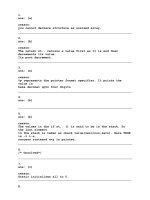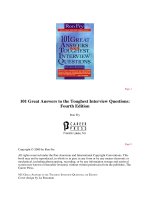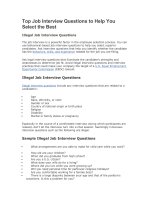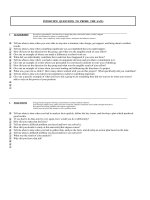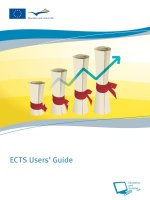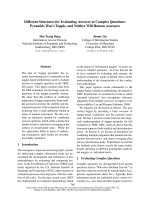101 Dynamite Answers to Interview Questions
Bạn đang xem bản rút gọn của tài liệu. Xem và tải ngay bản đầy đủ của tài liệu tại đây (681.76 KB, 215 trang )
cover
next page >
title:
author:
publisher:
isbn10 | asin:
print isbn13:
ebook isbn13:
language:
subject
publication date:
lcc:
ddc:
subject:
101 Dynamite Answers to Interview Questions : Sell Your
Strengths!
Krannich, Caryl Rae.; Krannich, Ronald L.
Impact Publications
1570231133
9781570231131
9780585160801
English
Employment interviewing.
1999
HF5549.5.I6K69 1999eb
650.14
Employment interviewing.
cover
next page >
< previous page
page_a
next page >
Page a
< previous page
101 Dynamite Answers to Interview Questions
page_a
next page >
< previous page
page_b
next page >
Page b
Books and CD-ROMs by Drs. Ron and Caryl Krannich
101 Dynamite Answers to Interview Questions
101 Secrets of Highly Effective Speakers
201 Dynamite Job Search Letters
Best Jobs For the 21st Century
Change Your Job, Change Your Life
The Complete Guide to International Jobs and Careers
The Complete Guide to Public Employment
The Directory of Federal Jobs and Employers
Discover the Best Jobs For You!
Dynamite Cover Letters
Dynamite Networking For Dynamite Jobs
Dynamite Résumés
Dynamite Salary Negotiations
Dynamite Tele-Search
The Educator's Guide to Alternative Jobs and Careers
Find a Federal Job Fast!
From Air Force Blue to Corporate Gray
From Army Green to Corporate Gray
From Navy Blue to Corporate Gray
Get a Raise in 7 Days
High Impact Résumés and Letters
International Jobs Directory
Interview For Success
Job-Power Source CD-ROM
Jobs and Careers With Nonprofit Organizations
Jobs For People Who Love to Travel
Mayors and Managers
Moving Out of Education
Moving Out of Government
The Politics of Family Planning Policy
Re-Careering in Turbulent Times
Résumés and Job Search Letters For Transitioning Military Personnel
The Savvy Interviewer
The Savvy Résumé Writer
Shopping and Traveling in Exotic Asia
Shopping in Exciting Australia and Papua New Guinea
Shopping in Exotic Places
Shopping the Exotic South Pacific
Treasures and Pleasures of Australia
Treasures and Pleasures of China
Treasures and Pleasures of Hong Kong
Treasures and Pleasures of India
Treasures and Pleasures of Indonesia
Treasures and Pleasures of Italy
Treasures and Pleasures of Paris and the French Riviera
Treasures and Pleasures of Singapore and Malaysia
Treasures and Pleasures of Thailand
< previous page
Ultimate Job Source CD-ROM
page_b
next page >
< previous page
page_i
next page >
Page i
101 Dynamite Answers to Interview Questions
Sell Your Strengths!
Caryl Rae Krannich, Ph.D.
Ronald L. Krannich, Ph.D.
Fourth Edition
< previous page
IMPACT PUBLICATIONS
Manassas Park, VA
page_i
next page >
< previous page
page_ii
next page >
Page ii
101 DYNAMITE ANSWERS TO INTERVIEW QUESTIONS: Sell Your Strengths!
Copyright © 1999, 1997, 1994, 1992 by Caryl Rae Krannich and Ronald L. Krannich. All rights reserved. Printed
in the United States of America. No part of this book may be used or reproduced in any manner whatsoever
without written permission of the publisher: IMPACT PUBLICATIONS, 9104-N Manassas Drive, Manassas Park,
VA 20111-5211, Tel. 703/361-7300.
Liability/Warranty: The authors and publisher have made every attempt to provide the reader with accurate, timely,
and useful information. This information is presented for reference purposes only. The authors and publisher make
no claims that using this information will guarantee the reader a job. The authors and publisher shall not be liable
for any loss or damages incurred in the process of following the advice presented in this book.
Library of Congress Cataloging-in-Publication Data
Krannich, Caryl Rae
101 dynamite answers to interview questions: sell your strengths!
/ Caryl Rae Krannich, Ronald L. Krannich. 4th ed.
p. cm.
Includes bibliographical references and index.
ISBN 1-57023-113-3
1. Employment interviewing. I. Krannich, Ronald L. II. Title.
III. Title: One hundred one dynamite answers to interview questions.
IV. Title: One hundred and one dynamite answers to interview questions.
HF5549.5.I6K69 1999
650.14dc21
99-27994
CIP
Publisher: For information on Impact Publications, including current and forthcoming publications, authors, press
kits, online bookstore, and submission requirements, visit Impact' s Web site: www.impactpublications.com
Publicity/Rights: For information on publicity, author interviews, and subsidiary rights, contact the Public Relations
Department: Tel. 703/361-7300.
Sales/Distribution: All bookstore sales are handled through Impact's trade distributor: National Book Network,
15200 NBN Way, Blue Ridge Summit, PA 17214, Tel. 1-800-462-6420. All other sales and distribution inquiries
should be directed to the publisher: Sales Department, IMPACT PUBLICATIONS, 9104-N Manassas Drive,
Manassas Park, VA 20111-5211
< previous page
page_ii
next page >
< previous page
next page >
page_iii
Page iii
Contents
Chapter 1
No More Sweaty Palms!
1
2
· Interviews Count the Most
3
· Exchanging Information
4
· Prepare Your "Best Self"
5
· You Need to Both Answer and Ask
6
· Create Your Own Interview Power
10
· Avoid Easy Temptations
10
· Choose the Right Resources
11
· Put Dynamite Into Your Interviews
Chapter 2
Interview Types and Techniques
12
12
· Variable Solutions
15
· Interviewer Goals and Expectations
17
· Interviewee Goals and Expectations
17
· Interview Types/Goals
18
· Informational Interviews
19
· Employment Interviews
19
· Screening Interviews
23
· New Electronic Screening Interviews
25
· Hiring/Placement Interviews
28
· Handling Several Formats
29
· Interview Settings
31
· Questioning Techniques
38
· Interview Structure
< previous page
page_iii
next page >
< previous page
next page >
page_iv
Page iv
Chapter 3
45 Key Interview Principles
42
42
· Different Goals
43
· Strategies For Interview Success
44
· Principles to Guide Interview Preparation
55
· Principles to Guide the Interview Encounter
68
· After the InterviewFollow-Up
Chapter 4
Dynamite Preparationy
70
71
· Prepare For the Interview
71
· Assess Strengths and Relate to Employers' Needs
72
· Research Your Field of Work and Related Organizations
74
· Prepare For the Verbal Interchange
77
· Nonverbal Elements of Success
78
· Deal With Logistics
Chapter 5
Dynamite Answers: The Verbal Interchange
79
79
· Interview Phases
82
· Interviewer's Questioning Concerns and Techniques
85
· Interviewee's Ways of Answering Questions
95
· Questions and Answers
145
· Illegal Questions
Chapter 6
Dynamite Answers: The Nonverbal Component
149
149
· The Nonverbal Edge
150
· A Winning Image
151
· Dynamite Images For Men
152
· Dynamite Images For Women
154
· Let Nervousness Work For You
155
· Project Composure
156
· Project Dynamism
158
· Project Class and Competence
Chapter 7
Dynamite Questions You Should Ask
160
160
· Ask Questions
161
· Questions About the Company
164
· Questions About the Job
< previous page
page_iv
next page >
< previous page
next page >
page_v
Page v
165
· Questions About the Work Environment
166
· Questions to Ask At the Close
167
· Questions About Salary and Benefits
169
· Questions About Relocation
Chapter 8
Dynamite Follow-Ups
171
171
· It's Not Over Until It's Over
172
· Keep the Process Going
173
· Follow-Up Means You Follow-Through
Chapter 9
101 Answers You Should Formulate
178
178
· Prepare For the 101
180
· Additional Questions
182
· Questions About YouPersonality/Motivation
184
· Questions About Education and On-Going Learning
186
· Questions About Experience/Skills
187
· Your Career Goals
188
· Questions About Why You Want the Job You Are Interviewing For
The Authors
191
Index
192
Career Resources
195
< previous page
page_v
next page >
< previous page
page_vi
next page >
Page vi
Dedicated in loving memory to
Caryl's brother
David Wayne Woodring
(Colonel USAF)
19471992
A dynamite attorney
A dynamite officer
And a dynamite brother, son, husband and father.
He is greatly loved,
greatly admired
and greatly missed.
< previous page
page_vi
next page >
< previous page
page_1
next page >
Page 1
1
No More Sweaty Palms!
"Tell me about yourself," the interviewer said after he had motioned that I should take the seat across from him.
"Would you prefer that I focus on my educational preparation or my work experience ?" I asked, realizing that a
lifetime autobiography would not serve either of us well in a job interview.
"Why don't you tie the two together and describe how your education prepared you to be effective in your most
recent position."
As I started to respond, I was grateful that I had anticipated and prepared for a question similar to this. I hadn't
expected it to be the first question I would be asked, but I was prepared and I knew I could respond better than
most applicants faced with this difficult beginning.
What are the first thoughts that come to mind as you contemplate a job interview? Is the surge of joy you feel at
having a chance at the joba chance to demonstrate to the interviewer that you are the person who should be
hiredovershadowed by feelings of nervousness? Do your fears of sweaty palms, a dry
< previous page
page_1
next page >
< previous page
page_2
next page >
Page 2
mouth, churning stomach, and wobbly knees leave you less than enthusiastic? If your answers to these questions
are ''yes," you have lots of company, and lots to learn.
However, since a successful job interview is a prerequisite for most jobs, it makes sense to find ways to turn
interview apprehension into interview anticipation. That's what this book is all about.
Interviews Count the Most
The job interview is the prerequisite to getting the job.
Interviews don't just countthey count the most. Take yourself back a few weeks. Maybe you wrote a terrific resume
and cover letter, networked with the right people, invited yourself to the interview through sheer persistence, or
just had a stroke of good luck. Whatever methods you used, congratulations; you are a "winner" at this stage of the
job search. You've become successful at what others only dream of achievinggrabbing the interest and attention of
employers who decide it's now time to see you in person. They need to further evaluate your qualifications to
determine if you will fit into their organization.
But it's now a whole new ball game. While writing resumes, following job leads, and contacting employers are
very important job search activities, the job interview is what really counts. Indeed, the job interview is the
prerequisite to getting the job. No job interview, no job offer. No job offer, no job. You simply must perform well
in the job interview if you are to land the job.
The skills you used in writing, distributing, and following-up your resumes and letters, researching companies, and
networking helped get you an invitation to meet hiring officials in person. You now have a personal invitationthe
door is open for you to meet
< previous page
page_2
next page >
< previous page
page_3
next page >
Page 3
those who have the power to hire. Now you must demonstrate another set of important skills once inside that
dooryour ability to conduct an effective interview. This means knowing how to best handle the interview situation
and the interview process. It involves everything from greeting the hiring official and managing questions to
following-up the interview within 48 hours.
Exchanging Information
The main purpose of the job interview is to exchange information about you, the job, and the employer. You do
this by answering and asking questions both verbally and nonverbally. This is a serious businessthe employer's
money in exchange for your talent. Therefore, you need to learn as much as possible about each other before
making any long-term commitments. This is not the time for playing any get-the-job games.
The process of answering and asking questions for you involves two important and sometimes contradictory
considerations:
1. Get the job: You must sufficiently impress hiring officials both professionally and personally so you will be
offered the job.
2. Get useful information: You must acquire critical information on whether or not you wish to join the
organization. In other words, the employer must also sufficiently impress you before you will accept a job offer.
These two considerations often compete with one other because of interview apprehension. Apprehension about the
interview situationcomplete with a dry throat, sweaty palms, and wobbly kneesleads some interviewees to
concentrate solely on playing
< previous page
page_3
next page >
< previous page
page_4
next page >
Page 4
the "good interviewee" role to the exclusion of acquiring important information for decision-making. Fearing they
will not sufficiently impress the interviewer, they become preoccupied with dressing right and giving "model"
answers to interview questions rather than concentrating on exchanging information and learning about the job and
the employer. They communicate anything but their real selves to employers.
You should not let this happen to you. After all, you owe it to yourself, and perhaps others close to you, to make
sound career decisions. The job interview is not a time for you to be someone else. Like your resume, your
interview behavior should represent the "unique you" to employers. This is the time to present your best self in the
process of learning about the job and the employer.
Throughout this book we stress the importance of lowering your apprehension, raising your anticipation, and
focusing on the main purpose of the interviewexchanging information that will help you make a critical career
decision as well as assist the employer in making an important hiring decision.
Prepare Your "Best Self"
The skills involved in answering and asking interview questions are not something you acquire overnight by
reading a book on how to conduct effective job interviews. They are communication skills you already possess but
which you may not have used for a while. What you need to do is refocus and sharpen those skills in relation to a
clear understanding of how the interview process unfolds and what you are expected to do in the interview
situation.
Indeed, you want to prepare well for all types of questions you are likely to be asked as well as identify several
questions you need to ask of the employer. This preparation involves everything from anticipating certain types of
questions and maintaining a
< previous page
page_4
next page >
< previous page
page_5
next page >
Page 5
positive attitude to expressing a particular answering style and presenting positive content in your answers. For you
want to be honest in everything you say and do. This by no means implies you should be either naive nor stupid in
what you say by confessing your weaknesses to hiring officials. You need to stress what is right about youyour
strengths and achievementsthose patterns that determine and support your success. This is what you should
concentrate on when preparing for the interviewpresenting your best self to employers who are interested in hiring
your strengths.
Without this preparation, you may not be able to present your "best self" to the employer. Your dry throat, sweaty
palms, and wobbly knees may take center stage as you make numerous interview mistakes that prevent you from
both impressing the employer and acquiring useful information. That would be unfortunate since you have already
come a long way toward landing the job. Whatever you do, don't short-change yourself by not preparing well for
possible interview questions.
You Need to Both Answer and Ask
This is what this book is all aboutlearning to sharpen communication skills you already possess in relation to the
interview situation and the interview process. You'll learn to present your best self to employers. We'll show you
how to make a smooth transition from your resume to the job offer. You'll answer and ask questions that both
impress employers and generate important information to assist you in determining if indeed this job is the right
"fit" for you.
Let's be perfectly clear what this book is not about. It is not a book on how you can take charge of the interview
situation. That would be presumptuous and you would probably become either overbearing or obnoxious, or both.
It is not a book on how to pull
< previous page
page_5
next page >
< previous page
page_6
next page >
Page 6
the wool over the eyes of the employer by arriving "dressed for success" and then dishing out "canned answers" to
interview questions. That would be dishonest. And this is not a book about how to cleverly manipulate the
interviewer to your advantage. That would be unethical, it assumes the interviewer is stupid, and the technique
probably would not work.
This is a book about some of the most important communication of your life. Doing well in a 30 to 60 minute
interview can have several positive outcomes for you and your career.
Create Your Own Interview Power
You can acquire the power to turn interview apprehension into interview anticipation and success. In the following
chapters we will share with you the secrets to interview success. We will focus on you in relationship to the
employerwhat you both need to do in order to arrive at a mutually satisfactory arrangement that will hopefully lead
to a satisfying long-term professional and personal relationship.
Our approach to this subject is very simple. We begin with you, the interviewee, and move you directly through the
interview process, from beginning to end. For the most part, the chapters flow in the same manner as the job
interviewa sequence of different interview questions you need to both answer and ask.
We begin in Chapter 2, "Interview Types and Techniques," by analyzing the interview situationtypes of interviews
you can expect to encounter as well as the structure of job interviews. We believe much of your apprehension is
related to these structural questions. We have added a section on behavioral questioning techniques in this edition
because many job applicants report encountering this relatively new line of questioning. The more you know about
the types of situations you are likely to encounter, the
< previous page
page_6
next page >
< previous page
page_7
next page >
Page 7
better prepared you should be for answering and asking questions both verbally and nonverbally.
In Chapter 3, "45 Key Interview Principles," we turn our attention to a comprehensive set of interview principles
that form the basis for effective interviewing. These principles are much more than just a scattering of hot tips,
generic experiences, common sense knowledge, or structured logic. Based on research and experience, they are a
well integrated set of principles that define effective communication in most professional and social settings. Our
principles cover three distinct interview stages you will most likely encounter during your job search:
· interview preparation
· interview encounters
· interview follow-ups
Taken together, these principles also constitute a well-defined strategy for conducting a dynamite job interview.
They are your tickets to interview success.
In Chapter 4, "Preparing For the Interview," we examine important interview preparation steps that go beyond just
practicing model answers and questions. You'll examine strategies and learn to anticipate interview scenarios in
this critical chapter that serves as a transition to the actual job interview.
We then turn our attention to the nuts-and-bolts of job interviewsspecific questions and answers. Based on our
principles of effective interviewing, in Chapter 5"Dynamite Answers: The Verbal Component"we examine the
verbal components of the interviewthe art of speaking well and the most common questions asked of interviewees.
Each question is followed with examples of dynamite answer strategies that will both impress interviewers and
generate useful information for decision-making
< previous page
page_7
next page >
< previous page
page_8
next page >
Page 8
purposes. These clearly illustrate our interviewing principles.
In Chapter 6"Dynamite Visuals: The Nonverbal Component"we turn to an equally important but often neglected
element in effective interviewingthe critical nonverbal components of the interview. Again, based on our principles
in Chapter 3, we discuss dynamite visuals which constitute another important channel for answering interview
questions. These nonverbal components are constantly affecting answers to interview questions. Indeed, they often
answer many nonverbalized questions the interviewer prefers not asking, because they may be illegal, or they
appear unprofessional or embarrassing to both ask and answer. You need to know about this silent language so
your nonverbal messages are the most appropriate possible. We'll show you how to communicate at this level
without uttering a single word. You may be surprised to discover your nonverbal answers to interview questions
are sometimes more important than your verbal answers! Chapter 6 addresses many such important interview
behaviors.
Chapter 7"Dynamite Questions You Should Ask"turns the interview table. The focus of attention shifts from
questions about you to questions concerning the job and the employer. While you will primarily answer questions
during the job interview, you also must be prepared to ask questions. After all, you need information about the job
and employer. You will gain some of this information when responding to the interviewer's questions, but you
should prepare a set of questions that address your most important concerns. Interviewers expect you to ask
intelligent questions which demonstrate your interest in the job and enthusiasm for the employer. In fact, the more
you find out about the job and the concerns of management, the better you can focus your responses to their needs.
This chapter identifies numerous questions you should ask in the process of both favorably impressing the
interviewer and gathering useful information.
< previous page
page_8
next page >
< previous page
page_9
next page >
Page 9
Chapter 8"Dynamite Follow-Ups"completes our examination of dynamite answers to interview questions. This
chapter is the critical action chapter. Here we address a much neglected aspect of the job searcheffective interview
follow-up methods. It's based upon a simple truism: you won't get the job offer until the employer takes action
beyond the question and answer interview encounter. There are certain things you can do to help the person reach
a decision, from follow-up telephone calls to thank-you letters. We identify the best follow-up methods as well as
provide some telephone dialogues and model thank-you letters for your reference.
Chapter 9"101 Answers You Should Formulate"presents a comprehensive checklist by category of the 101 sample
interview questions and answers addressed throughout the book as well as provides a useful orientation on how to
best handle each of the questions. The chapter is organized in this manner so you can review some of the most
important job interview questions and suggested answers based upon the 45 principles we outlined in Chapter 3. If
you need to prepare for a job interview that's coming up in a few days, this chapter will assist you in getting
quickly organized.
Taken together, these chapters constitute a crash course in effective job interview skills. Ideally you should
complete this book early in your job search. However, chances are you are reading it in preparation for an
impending job interview, which may be in another day or two! If this is your situation, we strongly recommend
focusing on the principles of effective interviewing as outlined in Chapter 3. These principles emphasize a
particular attitude and orientation you need to consistently present throughout the interview as well as during the
follow-up phase. These principles will help you formulate answers to the many standard interview questions you
will need to address without sounding like
< previous page
page_9
next page >
< previous page
page_10
next page >
Page 10
you have prepared "canned" answers. They also will help you handle the secret language of interview success.
Avoid Easy Temptations
One important word of caution is in order before you proceed further into this book. Whatever you do, don't try to
memorize canned answers to interview questions. Succumbing to such a temptation will probably produce negative
outcomes for you. This approach is likely to turn off interviewers who know you are being less than forthcoming; it
may even raise questions about your honesty and integrity. In addition, your nonverbal communication may negate
the messages you intend to communicate at the "canned" verbal level. Our examples of effective answers are
presented to illustrate the principles in Chapter 3 that should guide you through each step of the job interview
processpreparation, presentation, and follow-up.
Choose the Right Resources
This book is primarily concerned with communicating critical job and career information to employers in face-toface job interview situations. Each year millions of job hunters turn to career planning books for assistance. Many
begin with a general book and next turn to resume and interview books. Others begin with a resume book and later
seek other types of job resources, including letter writing and networking books. Some go directly to computer
software programs and CD-ROMs or visit various World Wide Web sites on the Internet for producing resumes
and preparing for job interviews.
If this book represents your first career planning book, you may want to supplement it with a few other key books.
Many of these
< previous page
page_10
next page >
< previous page
page_11
next page >
Page 11
books are available in your local library and bookstore or they can be ordered directly from Impact Publications
(see the "Career Resources" section at the end of this book). Most of these resources, along with hundreds of
others, are available through Impact's comprehensive "Career Superstore" on the Internet:
www.impactpublications.com. Impact's site also includes new titles, specials, and job search tips for keeping you in
touch with the latest in career information and resources. You also can request a free copy of their career brochure
by sending a self-addressed stamped envelope to:
IMPACT PUBLICATIONS
ATTN: Free Career Brochure
9104-N Manassas Drive
Manassas Park, VA 20111-5211
Put Dynamite into Your Interviews
Whatever you do, make sure you acquire, use, and taste the fruits of dynamite answers to interview questions. You
should go into the job interview equipped with the necessary knowledge and skills to be most effective in
communicating your qualifications to employers and acquiring important information on both the job and the
employer.
As you will quickly discover, the job market is not a place to engage in wishful thinking. It's at times impersonal,
frequently ego deflating, and often unforgiving of errors. It requires clear thinking, strong organizational skills, and
effective strategies. Above all, it rewards individuals who follow-through in implementing each job search step
with enthusiasm, dogged persistence, and the ability to handle rejections.
May you soon discover this power and incorporate it in your own dynamite answers to interview questions!
< previous page
page_11
next page >


